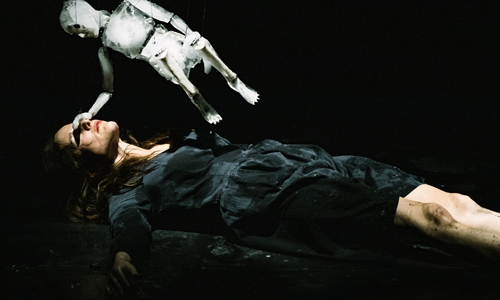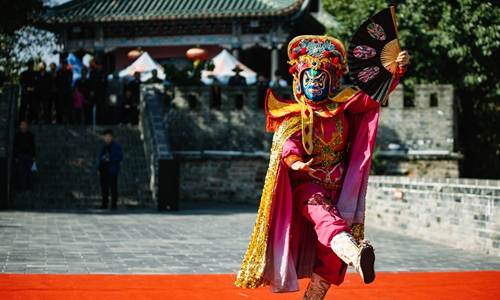ARTS / THEATER
International theater festival in Xichang, Southwest China’s Sichuan Province, bridges East and West

Promotional material for Anywhere Photo: Li Hao/GT

An actor gives a traditional face-changing performance in Sichuan Province. Photo: Li Hao/GT
When the lights in the theater go dark, the audience falls completely silent in anticipation. For many, this will be the first time they have had the opportunity to appreciate a Western theater work, as such shows are not commonplace in this third-tier city in Southwest China's Sichuan Province.This is Anywhere, a French avant-garde puppet show that debuted at the ongoing international theater festival in Xichang, Sichuan Province, on Saturday.
Theater fest
The award-winning Anywhere chronicles the trials of life through the lens of Oedipus on the Road, a novel authored by Henry Bauchau. This unique"visual poem" invites the audience to experience the different states of the element of water through a puppet made of ice as it slowly transforms into water and finally evaporates into vapor.
"This is not the first drama where we attempted to use a puppet made of ice," director Elise Vigneron told the Global Times on Saturday.
"When I read the novel, I hoped to express the process of life from birth to death, every moment of it. Then, I thought about 'what kind of material can I use?'"
In the end, Vigneron turned to ice.
"It can transform from solid to liquid and then to steam. Additionally, it perfectly matches the life and destiny of Oedipus," Vigneron explained.
For puppet maker Helene Barr, this would be no easy task as it meant she would witness the puppet's inception, and then its gradual melting, in a single day.
"For the initial performances, I felt sorry for it just as many in the audience did. But gradually I noticed that it is the melting down and then disappearing that makes it meaningful for each audience member to remember the Oedipus story and his destiny."
Besides shows like the Romanian drama Dream Before Breakfast and French circus Haute Heure, the festival also has a number of street tours and interactive events featuring China's rich cultural legacies such as Peking, Sichuan and Tibetan Opera.
Young hope
A city known to the world as one of China's important satellite bases, Xichang is also home to a number of ethnic minority groups, including the Yi and Tibetan people, whose cultures prominently feature singing and dancing.
Tobias Biancone, director general of the International Theatre Institute (ITI), told the Global Times on Sunday that he was touched by local performers, especially young kids who had a grand time singing and dancing on Saturday at a gala celebrating the festival.
"They are so dedicated and so happy to be able to show off their talents," he said.
"That is exactly what festivals like the Xichang International Theater Festival need to do and to be, a spark. Light up their desire to be entertained and fall in love with theater. Their spiritual fire needs to be ignited," Biancone added.
For the festival's initiators, such as Chinese actor Pu Cunxin, attracting audiences, especially young people, has always been the theater festival's first priority.
"The first step that we did is to inform them that we have such a festival with so many richly diverse dramas here in Xichang. After they discover this, they will choose what they like the most," Pu said.
He was also happy to see more young faces at the festival than at Western festivals, which tend to be attended by older audiences.
Telling Chinese stories
Localization has always been an important mission for international festivals like the Edinburgh Fringe and Avignon in France. In China, this is even more important as creatives are urgently trying to find ways to tell Chinese stories.
Biancone recalled his past dialogues with Western audiences about what is Chinese theater.
"Most of them may answer Peking Opera," he said.
"The international public has no idea what is going on here in China. Peking Opera is just a small part of China's rich culture, and Chinese Opera as well. China should create theater works based on their roots, in Chinese ways, not Western ones. Yesterday, I saw a dance that I've never seen before. That is something that China can present to the world. The richness of your nation, it can be drama, can be poetry, can be Chinese Opera performances."
At a forum during the festival, Japanese theater scholar Taeko Nagai echoed Biancone's thoughts that China is a storehouse of stories and that many Japanese theater works have even been inspired by these stories.
The key is to communicate and work together to make things happen.
Japanese director Makoto Nakashima told the Global Times that international festivals such as the one in Xichang can allow people from different backgrounds and cultures to communicate with each other.
One such example is Hero. Set to debut on Thursday, the play is the result of such international communication.
"It is possible to put people from different backgrounds, cultures and who speak different languages in a room together. That is exactly what we are doing now," Michael Leibenluft, the New York-based theater director behind the show, told the Global Times on Sunday.
"You don't need to come in one color, instead, many different colors together, that is great too. The possibility of combination is endless."




